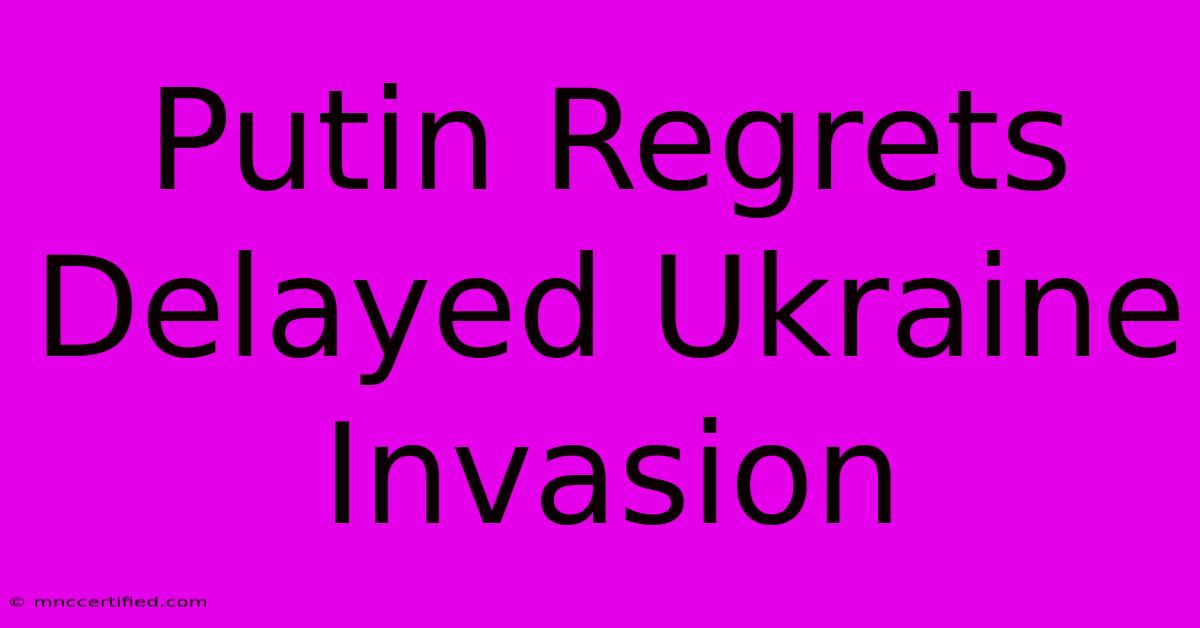Putin Regrets Delayed Ukraine Invasion

Table of Contents
Putin Regrets Delayed Ukraine Invasion: A Strategic Miscalculation?
The ongoing conflict in Ukraine has spurred much speculation about Russian President Vladimir Putin's decision-making process. A compelling argument gaining traction amongst analysts is that Putin regrets delaying a full-scale invasion of Ukraine. This article explores the evidence suggesting a delayed invasion proved a strategic miscalculation, analyzing the geopolitical landscape and the potential consequences of earlier action.
The Shifting Sands of Geopolitical Advantage
The initial stages of the conflict saw Russia's military struggle to achieve its objectives. Many experts believe a more decisive, earlier strike would have significantly altered the course of the war. A key element often overlooked is the impact of delayed action on international unity. The delay gave Ukraine and its Western allies crucial time to prepare. This preparation included:
- Strengthening Ukrainian defenses: The delay allowed for increased military aid and training from NATO countries, bolstering Ukraine's capacity to resist the invasion.
- Forging a united front: The initial hesitancy of some Western nations to provide substantial support gradually shifted to a strong, unified condemnation of Russia's actions. This unified stance proved far more formidable than a fractured response would have been.
- Imposing crippling sanctions: The time allowed for the implementation of comprehensive sanctions against Russia, severely impacting its economy and limiting its access to global markets. These sanctions, while controversial, were far more effective and extensive because of the delay giving time for deliberation and coordination.
The Missed Opportunity for a Swift Victory?
Some military analysts argue that an earlier, more decisive invasion might have achieved a quicker victory for Russia. The initial stages of the conflict revealed vulnerabilities in Ukrainian defenses. A preemptive strike, before Ukraine could fully mobilize its forces and receive substantial Western aid, could have potentially resulted in a more rapid conquest. This hypothesis, however, is countered by the argument that even a swift victory would have likely resulted in a protracted insurgency, undermining Russia’s long-term objectives.
The Economic and Political Fallout of Delay
The prolonged conflict has had a devastating impact on the Russian economy, far exceeding initial predictions. The delay allowed time for the implementation of sanctions that have crippled key sectors of the Russian economy. Furthermore, the delay also contributed to:
- Increased international isolation: Russia's prolonged aggression has resulted in unprecedented international isolation, damaging its diplomatic relations and weakening its global standing.
- Prolonged human suffering: The protracted conflict has caused immense human suffering on both sides, a cost that likely weighed heavily on Putin’s calculations, even if unintentionally.
- Erosion of public support (within Russia): While the Kremlin tightly controls information, the prolonged conflict and its economic consequences are likely affecting public opinion within Russia.
Putin's Calculus: A Post-Mortem?
While we can't definitively know Putin's internal deliberations, the evidence strongly suggests that the delay in launching a full-scale invasion proved a strategic miscalculation. The geopolitical landscape shifted significantly during the delay, leading to a much stronger and more unified opposition than Russia had anticipated. The consequences—severe economic sanctions, international isolation, and a protracted and bloody conflict—are far more significant than what might have been achieved with a more timely and perhaps decisive action. The delayed invasion highlights the complexities of strategic decision-making in an increasingly interconnected world.
Conclusion: A Lesson in Geopolitics
The war in Ukraine serves as a stark reminder of the importance of timely and accurate intelligence assessment in international relations. Putin's perceived miscalculation underscores the high stakes involved in military interventions and the unforeseen consequences of delaying decisive action. The long-term ramifications of this delay are still unfolding, making the conflict in Ukraine a case study for future geopolitical strategists. The ongoing situation continues to evolve, with its consequences reaching far beyond the borders of Ukraine and impacting the global order in profound ways.

Thank you for visiting our website wich cover about Putin Regrets Delayed Ukraine Invasion. We hope the information provided has been useful to you. Feel free to contact us if you have any questions or need further assistance. See you next time and dont miss to bookmark.
Featured Posts
-
Understanding Mr Beasts Partner Issues
Dec 20, 2024
-
Eamonn Holmes Isabel Webster Gb News Shakeup
Dec 20, 2024
-
Kraken Acquire Kakko
Dec 20, 2024
-
Survivor 47 The Winning Player
Dec 20, 2024
-
Should Celtic Sign Kieran Tierney
Dec 20, 2024